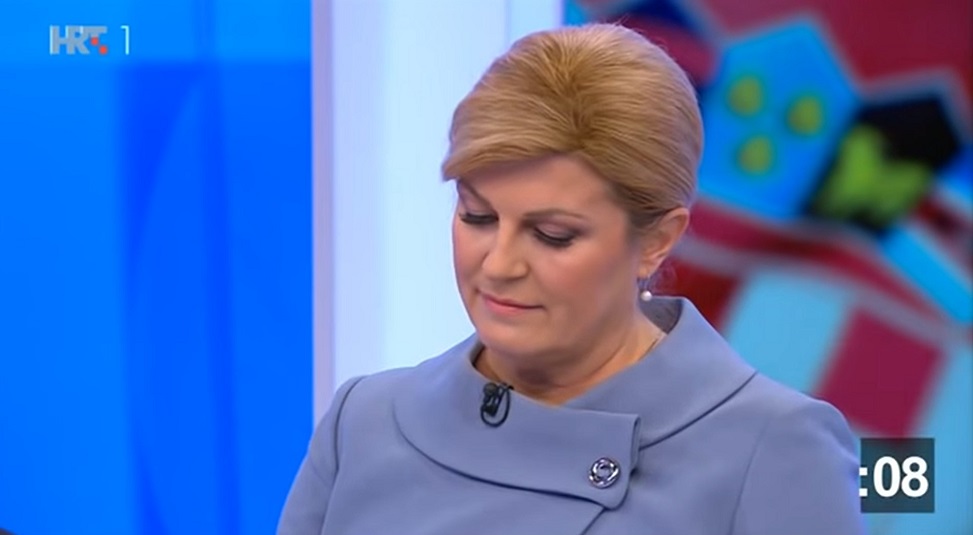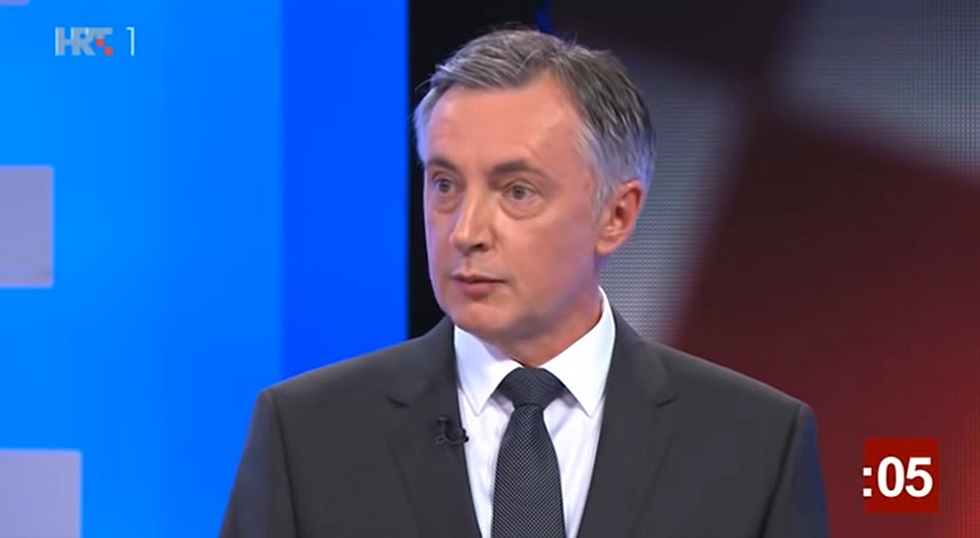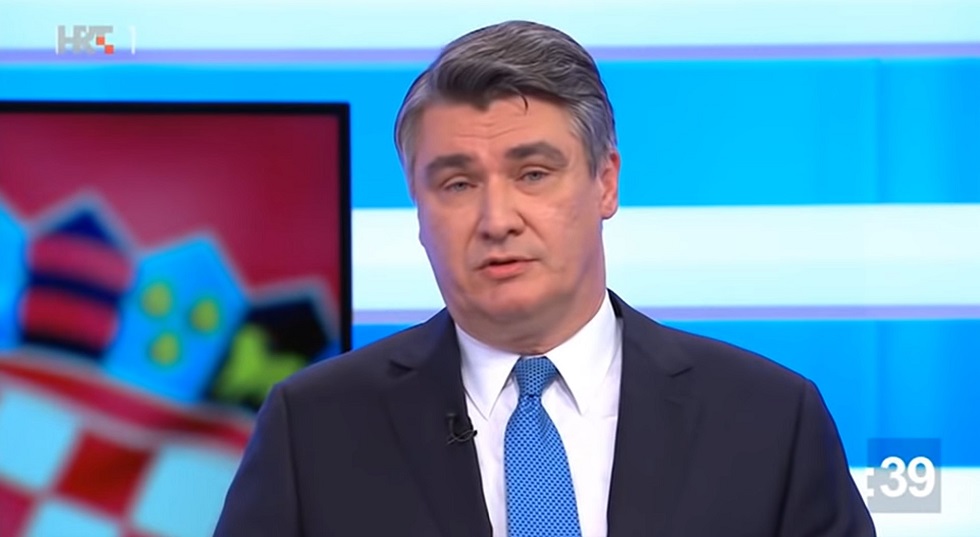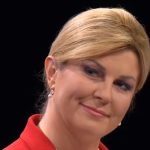Yesterday evening HRT (Croatian Radio Television) moderated a debate between all eleven presidential candidates. It lasted over two and a half hours.
Here is a summary of the top three candidates’ (Kolinda Grabar-Kitarović, Zoran Milanović, Miroslav Škoro) positions on abortion, religious education, “Za dom spremi” and gay pride – according to Index on December 18, 2019.
Croatian Candidates’ Opening Remarks
Kolinda Grabar-Kitarović: I have been your president for 5 years and have been among our people and listened to your problems. I have also repositioned Croatia from a region in Central Europe to a place on the Mediterranean, where it belongs. I’ve raised the issue of demography and I was the first Croatian diplomat.
Zoran Milanović: I have something to offer and want to make our country happier and freer. I have extensive experience and consider politics an honorable job. It is up to our citizens to decide.
Miroslav Škoro: Given that this game has begun, I would like to say that I am sorry that there wasn’t a debate on commercial television. I apologize for that. Kolinda is responsible for this and she must apologize.
Corruption in Croatian Society: How would you fight against it?
Kolinda: Constitutional obligations allow a president to be involved in secret service operations. I would build a collaborative relationship with secret services to address this problem. I’ve been fighting corruption for years, and it’s time to recruit young talent for jobs in secret services.
Milanović: I’m aware of the limitations of a president in this area. The president may nominate the President of the Croatian Constitutional Court and can set an example by whom he chooses to associate with. He sends a signal to the public by paying attention to whom he hangs out with.
Škoro: When it comes to corruption, it is an obstacle to doing business in the Republic of Croatia. I am the only entrepreneur here who deals with business and encounters real problems.

Should the Croatian army be sent to the borders?
Kolinda: The military should come to the aid of the police in border control. Presently, the police are saying they don’t need help. The border situation in 2015 was chaos.
Milanović: It’s mindless statement to call the 2015 situation chaos. We did a fine job of transporting people. The police need help now.
Škoro: The border of every country is sacred. There are laws regarding the residence and movement of foreigners. The border absolutely must be protected. There are three types of migrants – refugees, people seeking political asylum and people who want to get from point A to point B. If necessary, the military should be sent to the border.
Should Croatia block Serbia’s entry into the EU?
Milanović: Vučić is one topic. Serbia is another.
Škoro: The destruction of Vukovar, Škabrnja … We all know who’s responsible. We need to address the issue of missing persons, borders and reparations for people who were held (by Serbs) in detention camps. Serbia needs to join the EU only after it meets the highest democratic standards. I will not raise my hand for Serbia’s EU accession until that happens.
Kolinda: We need to talk about how to ensure a livelihood for our citizens. We will insist that Serbia meets all the conditions for accession, and they must come to terms with their past. I will absolutely insist that Serbia accounts for the people who are still missing (from the Homeland War in the 1990s) before they join the EU.
What kind of foreign policy should Croatia engage in with Bosnia?
Milanović: After 30 years of missteps, answering this question in one minute would be an insult to Bosnia. No one deserves to have their country summarized in one minute. I support a united Bosnia; half a million Croatians live there.
Škoro: Bosnia is a state of the Croatian people. Currently, Croatians in Bosnia are not autonomous. And Croatians did not elect the government led by Komšić.
Kolinda: Croatians in Bosnia are not the part of the diaspora. Rather, they are indigenous people there. We would support a good neighbor policy but are also fighting for the rights of the Croatian population there, without compromise. Bosnia has a strategic component for us. And to everyone who refers to Croatians in Bosnia as part of the voting machinery – that’s a grave insult.

Should official signs in Vukovar include the Cyrillic alphabet – Yes or No?
Milanović: This is a matter of law; the rule of law. I would deal with this issue the same manner again. No one is offended by the co-existence of the Cyrillic and Latin alphabet in Vukovar cemeteries. I’ve acknowledged that perhaps I moved a little too quickly (as Prime Minister), and I could apologize for that. The HDZ (Croatian Democratic Union), the party of Kolinda and Škoro, is the one who created the legal framework in Vukovar. That’s the truth and the whole truth. I enforced the law which HDZ put in place.
Škoro: I haven’t heard so much hate speech in one place for a very long time.
Kolinda: I’ve been going to Vukovar for years, for the (commemorative) days year after year. Their concerns are existential concerns, but war wounds still fester. Justice has still not been served. Why push for the Cyrillic alphabet before justice has been served? This issue needs to be addressed first, and then it will be right time to address the Cyrillic (signage).
Abortion?
Milanović: It’s a matter of choice. It’s a difficult situation, but it’s first and foremost a woman’s choice.
Škoro: I am against abortion and for protecting life from conception to death.
Kolinda: Life begins from conception to natural death. A ban on abortion would solve nothing and cause even more health problems. I am more for education, especially for young people, women and men, and for facilitating adoption and other measures which will reduce the number of abortions in the Republic of Croatia.
Religion in Croatian schools?
Škoro: The church is deeply rooted in the Croatian identity. I don’t see why having religious education in schools should be a problem. I spent my entire childhood and youth in religious education and didn’t learn anything harmful there.
Kolinda: Religious education is an elective subject. I don’t see what the problem is. Croatia offers religious instruction, which is a topic of culture in general. And children who do not go to church have an opportunity to learn something about other faiths.
Milanović: Religious education can be offered, but only as an elective course. But not in the third hour of school – that’s not an elective class. It must be at the end of the school day, during the last hour.
Would you participate in a gay pride or a pro-life march?
Škoro: We are discussing peripheral matters. Sexual orientation is a private matter for every person and should not be flaunted publicly, and I would gladly attend a pro-life march.
Kolinda: I do not know why these two demonstrations must be in opposition to one another. I only participate in the commemoration march (in Vukovar). I am responsible for all our citizens.
Milanović: Three days ago the Germans announced that homosexuality is normal. What else can I say?

What does Franjo Tuđman mean to you? Tito?
Kolinda: For me, Tuđman is of the same caliber of Dr. Ante Starčević. I also established the Velered (highest honor in Croatia) for Dr. Tuđman. Tito played a positive role in anti-fascism, but he committed crimes after that.
Milanović: Broz, Radić, Tuđman and Krleža – these are people who defined the Republic of Croatia in the 20th century.
Škoro: Milanović is responsible for Lex Perković (Josip Perković is the former director of Yugoslav-era Croatian secret police).
Milanović: Perković was a HDZ guy who ate out of Tuđman’s hand.
What are your views on the slogan “Za dom spremi” (Ready for the homeland)?
Škoro: It’s a salute that was used to say goodbye during the time of the NDH (Independent State of Croatia), but it was also on the sleeves of HOS members (among the first organized Croatian military defense forces in the Homeland War in the 1990s) and I don’t have a problem with that.
Kolinda: We need to stop discussing ideological issues. “Za dom spremni” was an Ustasha salute, but it was also on the insignia of the HOS forces and it had an entirely different meaning then.
Milanović: The Croatian Constitutional Court delivered two judgments which determined it to be hate speech.
Candidates’ Closing Remarks
Kolinda Grabar-Kitarović: I invite you to go to the polls on December 22nd. As your president, I have traversed every inch of this country and have developed my policies and program based on your problems, hopes and dreams. We must improve our situation. All I have heard tonight is a wish list, and rarely from anyone who really has a program. I am offering you action and diligence. Instead of inaction, I am committed to growth, sincerity and progress among our people and not arrogance. I am offering a message of unity: Croatia is for everyone.
Zoran Milanović: As your president, I will restore fundamental dignity and decency. As a politician I have worked hard and have made mistakes: abolished parliamentary pensions and opposed banks. Times change, I do not seek greater powers (within the Croatian presidency) because I consider those to be a path to tyranny. The president must maintain an objective distance and not be involved in money-related matters and staff decisions. I am here to serve and to seek your trust and vote.
Miroslav Škoro: This time (the presidential debate) was useful for viewers to see how futile this process is. I am a man who fights against the system. I am proposing radical changes and am seeking increased powers (within the Croatian presidency). On December 22, we will change the Constitution. I worry about one thing: my election observers have not yet received SEC (State Electoral Commission) accreditation and it all smells like election fraud.
https://www.youtube.com/watch?v=Omm6pbDAPk0
Follow our Politics page for more information on the presidential candidates and the upcoming elections.









